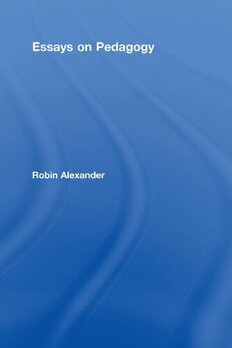
Essays on Pedagogy PDF
Preview Essays on Pedagogy
Essays on Pedagogy Pedagogy is at last gaining the attention in English-speaking countries that it has long enjoyed elsewhere. But is it the right kind of attention? Do we still tend to equate pedagogy with teaching technique and little more? Now that governments, too, have become interested in it, is pedagogy a proper matter for public policy and official prescription? In Essays on Pedagogy, Robin Alexander brings together some of his most powerful recent writing, drawing on research undertaken in Britain and other countries, to illustrate his view that to engage properly with pedagogy we need to apply cultural, historical and international perspectives, as well as evidence on how children most effectively learn and teachers most productively teach. The book includes chapters on a number of themes, expertly woven together: • the politicisation of school and classroom life and the trend towards a pedagogy of compliance; • the benefits and hazards of international comparison; • pedagogical dichotomies old and new, and how to avoid them; • the centrality of talk to development, learning and teaching and the empowering potential of classroom dialogue; • how education and pedagogy might respond to a world in peril; • the rare and special chemistry of the personal and the professional which produces outstanding teaching; • the scope and character of pedagogy itself, as a field of enquiry and action. For those who see teachers as thinking professionals, rather than as technicians who merely comply with received views of ‘best practice’, this book will open minds while maintaining a practical focus. For student teachers it will provide a framework for their development. Its strong and consistent international perspective will be of interest to educational comparativists, but is also an essential response to globalisation and the predicaments now facing humanity as a whole. Robin Alexander is Fellow of Wolfson College at Cambridge University, UK, Professor of Education Emeritus at Warwick University, UK, and Director of the Primary Review. His Culture and Pedagogy (2001) won the Outstanding Book Award of the American Educational Research Association. Essays on Pedagogy Robin Alexander First published 2008 by Routledge 2 Park Square, Milton Park, Abingdon, Oxon, OX14 4RN Simultaneously published in the USA and Canada by Routledge 270 Madison Avenue, New York, NY 10016 Routledge is an imprint of the Taylor & Francis Group, an informa business © 2008 Robin Alexander Typeset in Palatino by Florence Production Ltd, Stoodleigh, Devon Printed and bound in Great Britain by Antony Rowe Ltd, Chippenham, Wiltshire All rights reserved. No part of this book may be reprinted or reproduced or utilised in any form or by any electronic, mechanical, or other means, now known or hereafter invented, including photocopying and recording, or in any information storage or retrieval system, without permission in writing from the publishers. British Library Cataloguing in Publication Data A catalogue record for this book is available from the British Library Library of Congress Cataloguing in Publication Data Alexander, Robin J. Essays on pedagogy/Robin Alexander. p. cm. Includes bibliographical references and index. 1. Teaching. 2. Learning. I. Title. LB1028.A417 2008 371.102 – dc22 2008003199 ISBN10: 0–415–45482–4 (hbk) ISBN10: 0–415–45483–2 (pbk) ISBN13: 978–0–415–45482–7 (hbk) ISBN13: 978–0–415–45483–4 (pbk) For Karen Contents Acknowledgements ix List of abbreviations x 1 Introduction 1 2 Pedagogy goes East 9 3 Principle, pragmatism and compliance 43 4 Beyond dichotomous pedagogies 72 5 Talking, teaching, learning 92 6 Pedagogy for a runaway world 121 7 Words and music 154 8 Conclusion 173 Appendix: dialogic teaching 184 References 192 Index 208 Acknowledgements It is not possible to list all those to whom debts of gratitude are owed for their contributions to the various projects on which this book draws; and, as always, the ethics of educational research prevent one from naming the children and teachers to whom in a sense one owes most – for without engaging directly with them and their worlds there is little on the subject of pedagogy that one can say. However, I must acknowledge those institutions and organisations that provided platforms for what started as lectures or conference papers: Warwick University Institute of Education, Cambridge University Faculty of Education, the Hong Kong Institute of Education, the American Educational Research Association and the International Association for Cognitive Education and Psychology. I also thank the bodies that awarded grants for the work on which the papers draw: the Economic and Social Research Council, the Leverhulme Trust, the British Council and the Sir Edward Youde Memorial Fund. Thanks for permission to reproduce copyright material are due to Routledge (Chapter 3), Oxford University Press (Chapter 4) and the Governors of the Perse School (Chapter 7). My debt to fellow-toilers in the fields of education and pedagogy is apparent in the References, and I trust that they will take their appearance there as a mark of thanks rather than mere convention. I could try to single out those of the many cited there to whom I owe most, but instead I would rather name two people who have influenced and inspired me over several decades: not just in the undertaking of particular pieces of research or writing, but by setting standards of scholarship and insight that the rest of us rarely, if ever, achieve, and by imbuing these with wisdom and humanity of a kind which the current politico-educational ascendancy seems unable to comprehend, let alone value. They are Jerome Bruner and the late and much-missed Brian Simon. Finally, for her companionship and collaboration on journeys to distant parts armed with cameras, audio recorder, video recorder, film, tape, notebooks, schedules and other apparatus of ethnographic research, for assistance in making sense of the resulting data, for support during the lengthy and difficult process of writing and much more besides, I thank, above all, this book’s dedicatee, my wife Karen.
